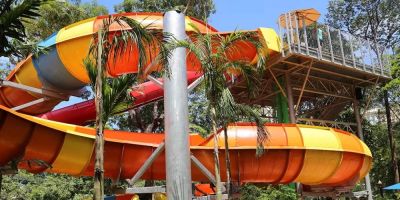How to Enjoy Water Parks with Sensory Sensitivities
Visiting a water park is an exciting adventure for many, filled with the joy of splash zones, water slides, and wave pools. However, for individuals with sensory sensitivities, these environments can often feel overwhelming. Having personally experienced the challenges of sensory overload at water parks, I’ve gathered a few strategies and tips to make such experiences more comfortable and enjoyable. This guide is aimed at helping those with sensory sensitivities, as well as parents and caregivers, to enjoy these fun-filled days with less stress and more fun!

Sun-N-Fun Lagoon
15000 Livingston Rd, Naples, FL 34109, USA
1. Understanding Sensory Sensitivities at Water Parks
Water parks are known for their loud sounds, bright lights, and crowds—all of which can be very stimulating. For someone with sensory sensitivities, such as those with autism or ADHD, these factors can cause anxiety, discomfort, or even physical distress. My first visit to a water park with a friend who has sensory sensitivities made me realize just how challenging it can be. The loud background music and the constant splashing sounds from the water slides made it hard to concentrate or enjoy the experience. However, understanding the specific sensory triggers and planning ahead can make all the difference.
The key sensory triggers at water parks include:
- Noise levels: The sounds of water splashing, people talking, and music playing can be overwhelming.
- Visual stimuli: The bright colors, flashing lights, and constant movement can be too much to process.
- Crowds: Large groups of people in confined spaces can increase anxiety.
- Temperature changes: Rapid shifts from warm to cold water, and from the sun to shaded areas, can also create sensory challenges.
2. Choose the Right Water Park
Not all water parks are created equal when it comes to accommodating sensory needs. It’s essential to research and choose a park that offers sensory-friendly options. Some water parks are now becoming more aware of sensory sensitivities and are offering quieter areas, special accommodations, and even sensory-sensitive days. For example, some parks have designated hours with reduced crowds and lower noise levels, perfect for families or individuals seeking a calmer experience.
Before visiting a park, check its website for information on sensory accommodations. Many parks now have sensory rooms, quieter zones, or other spaces where you can take a break from the hustle and bustle. Additionally, consider calling ahead to speak with customer service and inquire about the park’s accessibility for those with sensory sensitivities.

Disney's Blizzard Beach Water Park
Bay Lake, FL 32836, USA
3. Plan Your Visit During Off-Peak Hours
One of the best strategies I’ve learned is to visit water parks during off-peak hours. Crowds can significantly exacerbate sensory sensitivities, so visiting during times when the park is less crowded is key to having a more comfortable experience. Typically, weekdays in the early morning or late afternoon tend to be quieter, and you can often avoid the overwhelming midday rush.
When you visit during less busy hours, you can enjoy the attractions with fewer people around, and the noise levels will be much more manageable. Plus, it’s easier to find a quiet spot to retreat to when things get too overwhelming. Plan your visit around the less crowded hours to maximize enjoyment without the sensory overload.
4. Bring Sensory Tools and Comfort Items
Bringing comfort items that help manage sensory sensitivities is another great tip. Headphones, for example, can block out some of the louder sounds that can be uncomfortable. My friend always brings noise-canceling headphones when we visit places with high noise levels, and it has made a huge difference. If you’re sensitive to the sun, a wide-brimmed hat or sunglasses can help reduce visual stimuli. A calming sensory toy, such as a fidget spinner or textured item, can also be helpful when things feel overwhelming.
For those with tactile sensitivities, consider wearing water shoes or comfortable clothing that won’t irritate the skin. Some people also find it helpful to bring along their favorite calming scents or lotions, as familiar smells can provide comfort and grounding. These items can help create a buffer between the overwhelming environment and personal comfort.
5. Use a Sensory-Friendly Map
Before heading to the park, take some time to study the map of the water park. Look for quieter areas or shaded spots where you can take breaks if the environment becomes too stimulating. It’s also helpful to identify the locations of restrooms, food stands, and designated rest areas, as these spots can offer a moment of calm when things get too intense.
Some water parks even provide special sensory-friendly maps for families with children who have sensory sensitivities. These maps highlight quieter zones and areas that are less crowded, making it easier to navigate the park without feeling overwhelmed.
6. Take Frequent Breaks
Water parks are designed to be immersive, with attractions that keep you on the move. But for someone with sensory sensitivities, it’s essential to take frequent breaks to recharge. When I visited with my friend, we made sure to stop every 30 minutes or so in a quiet area to decompress. Sometimes, a brief break is all it takes to re-energize and return to the fun of the park without the sensory overload.
During these breaks, you can relax, hydrate, and enjoy a snack or light meal. It’s also a good time to talk with your group about what’s working well and what’s too overwhelming. Creating a flexible schedule allows everyone to enjoy the park at their own pace, ensuring that everyone’s needs are met without causing stress.
7. Be Patient with Yourself or Others
Lastly, it’s important to be patient. If you’re visiting the park with someone who has sensory sensitivities, or if you’re experiencing the park yourself, remember that it’s okay to step back when needed. It’s completely normal to feel overwhelmed by the loud noises, bright lights, and large crowds. Taking a break or leaving for a while doesn’t mean you’ve failed—it's just part of making the experience enjoyable and manageable for everyone involved. It’s important to prioritize comfort over pushing through the stress.
Conclusion
While visiting a water park can seem daunting for those with sensory sensitivities, it doesn’t have to be a stressful experience. By choosing the right park, planning ahead, and bringing along comforting items, you can create a more enjoyable experience for yourself or loved ones. The key is to make accommodations and adjustments that meet your needs and allow you to enjoy all the fun that water parks have to offer. So, don’t let sensory sensitivities stop you from experiencing the joy of water parks—use these tips to ensure a fun, comfortable, and memorable day in the sun!










